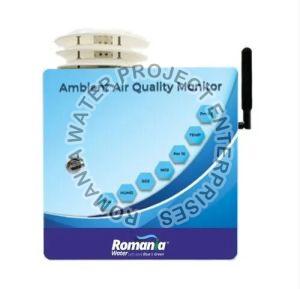
Romaina Ambient Air Quality Monitor
150,000 Per Piece
1 Piece (MOQ)

petrimedca air quality monitor
12,000 - 12,500 Per Box
1 Box (MOQ)
Best Deals from Air Quality Monitors

Ambient Air Quality Monitoring System
Get Price Quote
These measurements are used to determine the human exposure to pollutants and can be combined with trace/background monitoring as well as stack monitoring to assess an organizations contribution to pollutants, and the effect this has compared to natural levels. We provide anayser shelter constructed from various material such as stainless steel SS304 or SS316 or painted galvenized steel. The shelters are designed and manufactured to ensure the reliable performance of the analyser and their systems , to ensure an optimum operation and maintenance of the analyser by the plant personnel, to ensure the safety of the personnel, and minimize the impact on the environment at customer plant site. Clean air is made up of nitrogen, oxygen and argon, with traces of other gases such as carbon dioxide. Air pollutants mainly come from the discharges of gases and particles, mostly from industry, motor vehicles and domestic wood burning. There are also natural sources such as windblown dust and smoke from bushfire. Some forms of air pollution create global problems requiring international solutions; for example, upper-atmosphere ozone depletion and acid rain. The enhanced greenhouse effect also falls into this category. The most widespread pollutants include carbon monoxide, volatile organic compounds, ozone, oxides of nitrogen, sulfur dioxide and particles. These substances are used as indicators of air quality. Air pollution can cause health problems. For example, high concentrations of air pollutants (poor air quality) can aggravate existing respiratory diseases such as asthma and bronchitis, or increase the risk of respiratory problems. To protect the environment against harmful and unhealthy levels of air pollution, Environmental Protection Agencies (EPA) adopt objectives to protect a range of beneficial uses, including the health and well being of humans, plants and animals. These policies cover all the major pollutants as well as specific industrial pollutants from chimneys. There are more stringent controls on industrial discharges of pollutants that may have adverse health effects or are highly toxic. We specialise in air quality monitoring instruments and systems. We manufacture our own range of air quality analyser system and are able to offer fully integrated monitoring systems. Our air quality monitoring cover a wide variety of gases from background/trace levels, through ambient systems level. The most common form of air quality monitoring is ambient air monitoring. Ambient air monitoring involves the measurement of “representative” air in urban, industrial and rural areas. These measurements are used to determine the human exposure to pollutants and can be combined with trace/background monitoring as well as stack monitoring to assess an organisation’s contribution to pollution, and the effect this has compared to natural levels. Visibility is also measured as part of an air quality management system for ventilation control, as well as secondary smoke detection.